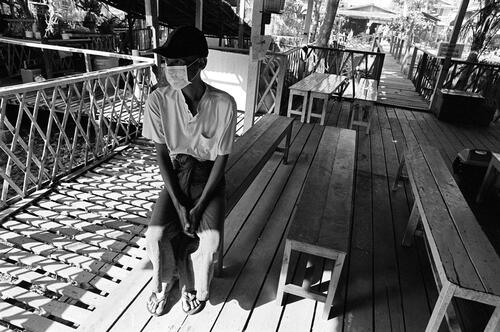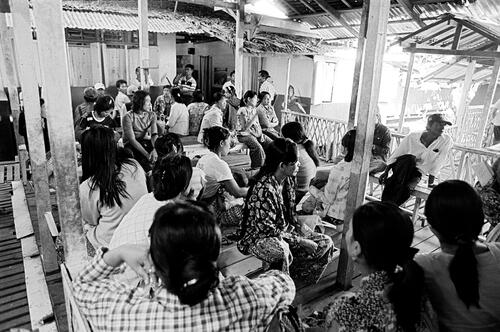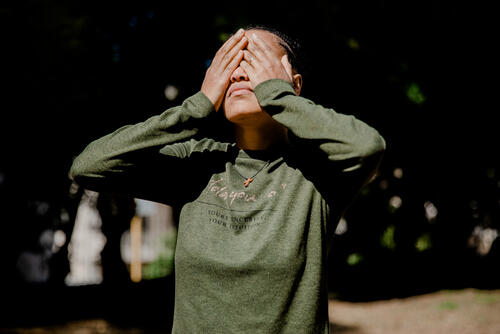The story of Maung Myint, a TB and HIV patient struggling to get lifesaving treatment in Myanmar, as donors slash future funding.
Maung Myint, 38, clings to his water bottle taking frequent sips of the liquid mixed with rehydration salts. He sits in a treatment room in a busy clinic run by Médecins Sans Frontières (MSF) in Myanmar.
“I used to make flip-flops, with a technique I inherited from my parents. They were experts in making flip flops and football shoes. But then I started to get fever and diarrhoea. That’s why I went to the government hospital and they gave me an HIV test, and I found out I was HIV positive”.
Maung Myint also has tuberculosis (TB), a common co-infection with HIV and the leading cause of death for people living with HIV. TB prevalence in Myanmar is nearly three times the global average, and Myanmar is among 27 countries with the highest Multi Drug Resistant-TB (MDR-TB) rates in the world.
“MSF cannot yet provide me with ART, so I’m only taking anti-TB treatment. But it is not enough. Before I got sick I was very healthy – I really liked to run and play sports. But after I was infected I couldn’t do anything.”
An estimated 120,000 people living with HIV/AIDS are in need of lifesaving Anti Retroviral Therapy (ART) in Myanmar. In 2010, according to national estimates less than 30,000 received it. MSF is the biggest provider of ART in the country. We are currently treating more than 23,000 people and with over 6,000 new patients to be enrolled in 2012, we are pushing the limits our capacity.
“When I found out I was HIV positive I was really sad and upset. I thought that there was no treatment for HIV. I thought I would die in one day."
Faced with overwhelming numbers and with few treatment options to refer to, MSF is forced to make impossible choices about who we can treat. And who we can’t. In some areas our staff are forced to turn away patients who should be on treatment, but who are not yet sick enough. Treatment is reserved for the very sickest.
“I really am sad that I can’t make flip-flops. I am an expert in making them and I can earn a lot of money from this, but I can’t do it anymore. So I have to ask others for help but I don’t want to. I hate the situation I’m in.”
Meanwhile MDR-TB is a serious and emerging threat. It has the same airborne transmission as non-resistant TB but is far more complex and lengthy to treat. It takes two years to treat an MDR-TB patient compared to the usual 6 months for non-resistant TB patients. During that time patients have to take an even bigger cocktail of drugs with severe side effects.
28-year-old Ma Moe Moe had to travel for 2 days even to get tested for MDR-TB.
“I had to leave my children in my home town. It cost us 50,000 kyat ($73) to get here. The last year has been horrible, I was on continuous treatment for eight months - it was really painful I had severe side effects from the tablets. It was all horrible."
Ma Moe Moe, is one of the lucky ones, of an estimated 9,300 people newly infected with MDR-TB each year in Myanmar, so far just over 300 people have been receiving treatment. She is now over the worst of her treatment.
“Now, I am really happy as my children are now with me again. Now my injection course is complete and I am reunited with my children. I am very happy."
As with non-resistant TB, -perfectly healthy people can easily be infected with MDR-TB.
In November 2011, the Global Fund to Fight AIDS, TB and Malaria cancelled its next round of funding – (Round 11), due to start releasing funds in 2012. The loss of the anticipated funds for HIV and TB treatment is a tremendous blow to Myanmar, the least developed country in south-east Asia, and one of the lowest recipients of Official Development Aid in the world. Expected funds would have paid for 46,500 additional patients to receive ART, building on new momentum to tackle the health crisis and helping to bring total ART coverage close to 100,000 by 2018.
Without funding, tens of thousands of lives, people like Maung Myint, are hanging in the balance in Myanmar. The decisions donors now take are the difference between life and death for these people.
Note* unless otherwise indicated all patient names have been changed.
On 22 February 2012, MSF launched, ‘Lives in the Balance’, a report outlining the situation for people affected by HIV and TB, with a special focus on multi drug resistant TB (MDR-TB), in Myanmar today. It calls for urgent funding and assistance to be made available by the international donor community to help Myanmar close the devastating gap between people’s need and people’s access to treatment for HIV and TB.





